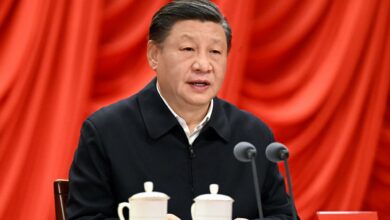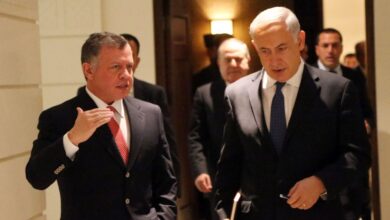Jerusalem–Israeli Prime Minister Benjamin Netanyahu says the current restrictions on West Bank settlements will not remain in place, however there will still be some limits on construction.
Israel's ten-month slowdown on new housing starts in West Bank settlements expires at the end of this month and is a key point of contention in newly launched peace talks with Palestinians.
Netanyahu told Mideast envoy Tony Blair the Palestinians want a total freeze in construction. "That will not happen," he said.
Israel will not build "tens of thousands of housing units that are in the pipeline, but we will not freeze the lives of the residents" of the settlements, Netanyahu said.
"The foundation of the state of Israel is that it is the nation-state of the Jewish people," Netanyahu said at the start of the Israeli Cabinet's weekly meeting, days ahead of a crucial peacemaking session in Sharm al-Sheikh. "That is the real basis of the end of demands from the state of Israel and the end of the conflict between the two peoples."
Netanyahu has made recognition of Israel's Jewish character a central demand, suggesting the Palestinians' failure to do so means they have not come to terms with Israel's existence.
Veteran Palestinian negotiator Nabil Shaath said Israel was using this demand as a pretext to withhold full rights from Palestinian citizens of Israel and to deny the right of return to Palestinian refugees from the war surrounding Israel's 1948 independence.
Israel's Arab minority, who make up about 20 percent of the population, enjoy full citizenship rights but have long suffered from discrimination in jobs, housing and other areas.
"We don't deny that that there is a majority of Jews in Israel," Shaath said. "But we deny their requirement that we recognize that Jewishness when there are a million and a half Palestinian Christians and Muslims who are citizens of Israel today."
This demand could come up again when Netanyahu meets on Tuesday with Palestinian President Mahmoud Abbas for their first meeting in the region since talks were officially launched at the White House earlier this month.
U.S. Secretary of State Hillary Rodham Clinton and former Sen. George Mitchell, President Barack Obama's special envoy to the region, will be joining that meeting at Egypt's the Red Sea resort of Sharm el-Sheik, before moving to Jerusalem for a second day of talks on Wednesday.
In a cordial first round in Washington earlier in September, the two leaders had promised to keep meeting at regular intervals, with the aim of hammering out the broad outlines of an agreement within a year.
The most immediate obstacle, however, is the Palestinian negotiating team's demand that Israel extend a curb on new construction in Jewish West Bank settlements, due to expire on 26 September.
Netanyahu has not tipped his hand, but he faces conflicting pressures: Many of his political allies object to extending the slowdown, which they only agreed to under stiff US pressure.
Obama said Friday that he has urged the Israeli leader to stretch the slowdown as long as talks are productive.
Netanyahu's office refused to comment on Obama's calls.




